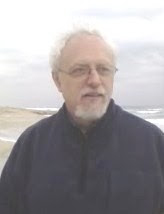
People often misunderstand what interfaith interaction is about. I would like to tell you about a recent anonymous interfaith interaction that I had which illustrates this point.
About a week ago I had a breakfast meeting with some colleagues at a restaurant near where I live.
After breakfast, when I walked up to my truck, I found that someone had inserted a card in my driver's side window that had the word "coexist" on it. The word was made up of symbols, much like the one above. The other side of the card was filled with words that were in a type size so small that it made the writing almost unreadable.
I have the bumper sticker pictured above on the back of my pickup truck. I thought the person that left the card in my window was a friend who wanted to show that he or she agreed with the sentiment of the bumper sticker.
And in all honesty, I did not read the tiny words on the back of the card.
When I left the restaurant I stopped by the home of my partner Fran.
I showed her the card and started talking to her about something else. But she stopped me in mid-sentence and asked me if I had actually read the backside of the card. I shook my head. She told me that the card had not been left by a friend and supporter, but actually by someone who challenged the notion of interfaith co-existence.
But the person who wrote the text on the card misunderstood, I think, the goal of coexistence. The card implied that those in favor of coexistence wanted to blend all religions into just one. The text went on to say that there was only one way to heaven, and that was through Jesus Christ. I have two issues with this. I suspect those who produced the card feared that those in favor of coexistence are in favor of getting Christians to another religion. We're not. Let me take a moment to explain what coexistence means to me.
First, interfaith work that aims at peaceful coexistence, is to me, NOT about creating one religion. It instead focuses on celebrating what makes each religion distinct and actually unique. Of course it also celebrates what religions have in common, but I find that the different ideas about spirituality and religious practice that I discover in Islam, Buddhism, Hinduism, Judaism, the Baha'i faith and other religions enrich my experience. Still, I have no intention of converting to another religion, nor would I encourage anyone else to convert.
And finally, let me say something that may be surprising. I have no problem with the fact that some Christians believe that the only way to God and Heaven is through Jesus, anymore than I would challenge some Jews or Hindus or Muslims who may feel the same way. It is simply important that we learn to coexist in the sense of learning to live peacefully together side by side, recognizing our differences. And even for the most ardent fundamentalist (in any religion) I would say that you can hold that belief and still learn things from encounters with other religions that will improve your spiritual practices. There will be more about this later.


